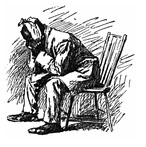
Ralph Ellison’s Angle of Vision
HARVARD DIARY
For many years Ralph Ellison’s Invisible Man has been a mainstay, a highlight of the teaching I try to do. I call upon novelists, poets, old-fashioned moral essayists to give students a hand at figuring out this life — its hurdles and impasses, its possibilities. James Agee and George Orwell help us imagine how it goes when one leaves a familiar, relatively privileged world for another kind of living (Let Us Now Praise Famous Men and The Road to Wigan Pier). William Carlos Williams and Raymond Carver and Tillie Olsen connect us with ordinary, often hard-pressed Americans and their constant struggle to stay afloat. Walker Percy and Flannery O’Connor and Dorothy Day and Simone Weil bring us closer to the spiritual side of our 20th-century life — and not with easy sentiment, but hard, demanding (occasionally humorous or ironic) candor. We read those three great Victorians, Dickens, Eliot, and Hardy (Great Expectations, Middlemarch, and Jude the Obscure) for their enormous, knowing, telling wisdom about human nature — their evocation of the social forces that weigh on all of us constantly: such a clearheaded contrast, those three, to the murky, cluttered shop-talk of the social scientists that gets called, these days, “expertise.” We also read Zora Neale Hurston’s Their Eyes Were Watching God, and Ellison’s enormously suggestive and singular novel Invisible Man, a work of narrative genius and an effort to come to terms with the abstraction “race.”
Yet, I’ve always squirmed at the linkage of that word “race” to Ellison’s work (I suggest that the students also read his two collections of essays: Shadow and Act and Going to the Territory). I can hear him (I have heard him) take exception — remind us all that he is very much a particular storyteller, distinctly American, of a certain Oklahoma early 20th-century world. He had little use for the generalizations and categorizations all too readily summoned in the name of racial understanding. “It’s a balancing act,” I recall him remarking — and he explained the image tersely: “Not to make too much or too little of who you are when you’re writing about the subject called ‘race.'” He spent his life as a writer letting us know how carefully, warily, he walked, ever anxious not to be dragged down by the baggage others would insist that he carry; ever anxious to hold his head high, so that his eyes could look in all directions, see well ahead, lest he get sidetracked or stumble and fall into this or that ditch (moral, psychological, cultural).
To be sure, Ellison, who died this year, was not a white man. He keeps mentioning the particular “Negro experience” that informed his childhood, his coming of age. But he was always at pains to emphasize how much his American self contributed to his writer’s sensibility. Indeed, even if the narrator of Invisible Man may go unnoticed by many of his countrymen, he is in no way blinded by that state of affairs — the temptation of an angry, retaliatory indifference on the part of the persecuted to a long-time, hateful tormentor. The novel’s central figure misses little, tells not only of black history and culture, black psychology and politics, but directly and by implication gives a full account of a nation’s mid-century life — the rural Southern version and the urban Northern one. Soon enough the reader realizes that a powerfully lyrical and savvy observer aims for a look both wide and deep; a confrontation with values and assumptions that are not at all segregated by the barrier of skin. It is mankind that Ellison is regarding — our all too universal capacity to deceive ourselves, never mind others; and our inclination, always, to demean ourselves by conning and tricking others, laying them low in thought and deed — a desperate effort, thereby to enhance ourselves, boost our opinion of who we are, what we’ve become.
You May Also Enjoy
Today we act as if the only kind of remorse we really know is unconscious, a response of the imagination.
I know a successful businessman who is a victim of spiritual poverty, and some materially impoverished people I’ve met are spiritually affluent.
Many parents have no control over their own lives, never mind their children's — and yet yearn for certain moral improvements while fearing they'll never take place.

